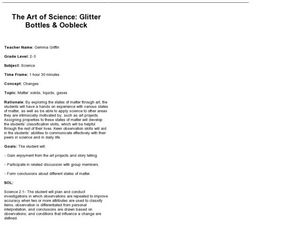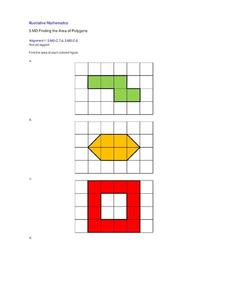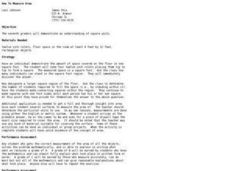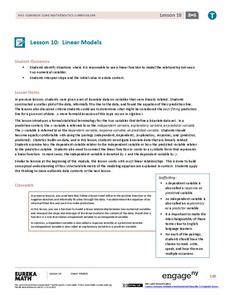Science Matters
Earthquakes and Volcanoes Post Assessment
The final lesson in the 20-part series is a post assessment covering earthquakes and volcanoes. Twenty-three questions incorporate each of the previous lessons through multiple choice, justified multiple choice, expanded multiple choice,...
Science 4 Inquiry
Introducing the Types of Energy
Young scientists explore many different types of energy including light, heat, nuclear, sound, potential, and more. They match the types of energy and identify when energy transfers from one type to another.
EngageNY
Writing Equations Using Symbols
Build upon prior equation writing experience to create more complicated equations. Lesson one in a 33-part unit builds upon the class members' sixth and seventh grade experience of writing linear equations. Several examples...
Curated OER
The Art of Science: Glitter Bottles and Oobleck
After having a class discussion on the three states of matter, young scientists utilize the wonderful substance, Oobleck in order to experience something that changes states of matter. They also create "sparkle jars" which...
California Education Partners
Summer Olympics
Quickly get to the decimal point. The last assessment in a nine-part series requires scholars to work with decimals. Pupils compare the race times of several athletes and calculate how much they have improved over time. During the second...
EngageNY
Solving Basic One-Variable Quadratic Equations
Help pupils to determine whether using square roots is the method of choice when solving quadratic equations by presenting a lesson that begins with a dropped object example and asks for a solution. This introduction to solving by...
Illustrative Mathematics
Equivalent Expressions
Here is a straight-forward problem of multiplying two binomials with a twist. It is up to algebra learners to decide how to turn this product of sums into a sum of products. However, it is not the quadratic that is the answer; it is the...
Curated OER
Differing Federal Responses to the Great Depression: Letter Analysis
Young analysts examine two letters, one written by President Hoover and one written by FDR. Each letter contains that president's response to the role of the Federal Government during times of crisis (The Great Depression). They analyze...
Curated OER
A News Story of Your Own: Sentence and Lexical Variety
Given the two-sentence skeleton of a news story about a car theft/joy ride, budding writers create their own version of the story varying diction and sentence structure to heighten interest and complexity in their writing. Resource...
EngageNY
Solving Equations Involving Linear Transformations of the Coordinate Space
Explore methods for solving linear systems with your classes and introduce learners to using matrices as a viable method. Scholars are able to recognize situations where matrices are the efficient method of solving. Application...
Asian Art Museum
Defining "Home"
Open-ended dialogue and guiding questions lead children through a discussion about the relationship between physical objects and personal identity. They analyze the work of two contemporary Japanese artists who have use their mediums to...
Curated OER
Drawing with Thread
After a study of work by Wassily Kandinski, have your aspiring artists recreate "Drawing with Yarn." It was one of his works made in 1913 that demonstrates his abstract style. What a beautiful work of art to make with your class!
Curated OER
Finding the Area of Polygons
Third graders are exposed to finding the area of polygons by decomposing figures and recomposing them into rectangles. This strategy allows children to expand on their prior knowledge of constructing shapes by rearranging parts into...
Curated OER
How To Measure Area
Geometers learn how to measure the area in square units. They use the floor in the classroom as a visual to measure a square foot area. They use classmates to fill the space and expand the measured area square foot by square foot until...
Curated OER
Romeo and Juliet: To Tell, or Not to Tell
Should Romeo and Juliet have revealed their engagement to their parents? After reading Acts I and II of Shakespeare's Romeo and Juliet, your class discusses this question with a SMARTboard presentation (though the lesson still works...
Curated OER
Temperature
Several slides compare different temperature scales. Thermal expansion, heat transfer, and Maxwell speed distribution are also explored. The last two slides seem unrelated to the topic of heat, but are easily left out of this otherwise...
EngageNY
Solve for Unknown Angles—Angles in a Triangle
Assist your class with each angle of geometry as they use exterior angles to form linear pairs with adjacent interior angles. They cover multiple vocabulary terms and work practice problems, complete with justifications, before...
Curated OER
Sharing is Caring
By engaging in an arts-based activity, 2nd graders explore peace in the classroom. They listen to the story The Rainbow Fish, then create their own fish to hang in the classroom. They write three things that make them happy on...
EngageNY
Linear Models
Expand your pupils' vocabulary! Learn how to use statistical vocabulary regarding linear models. The lesson teaches scholars the appropriate terminology for bivariate data analysis. To complete the module, individuals use linear...
Curated OER
Holding a 'Peace Hug' at your School
Students consider feelings. In this positivity lesson, students realize how they can create a peaceful environment with their words and actions. They discuss feelings and personal experiences as a class and expand out to the rest of...
Curated OER
Opinion through the Ages: Exploring 40 Years of New York Times Op-Eds
What is the role of a newspaper's Op-Ed page? High schoolers explore the New York Times' "Op-Ed at 40," an interactive feature that lets them browse through 40 years worth of op-ed features, and consider the purpose and value of this...
Lerner Publishing
Meet the Dinosaurs
Take your class of youngsters on a prehistoric adventure with this four-lesson series on dinosaurs. Accompanying the Meet the Dinosaurs books by Don Lessem, these lessons engage children in writing their own dinosaur books,...
Curated OER
Using Algebra Tiles to Explore Distributive Property
Math is fun with algebra tiles! Young mathematicians explore eight expressions involving the distributive property and use algebra tiles to expand simple expressions. The resource is perfect for both guided and independent practice.
EngageNY
Multiplication of Numbers in Exponential Form
Develop a solid understanding of multiplication and division properties of exponents. Individuals expand exponential terms to discover the patterns and create the properties in the second installment in a series of 15. The activity...























